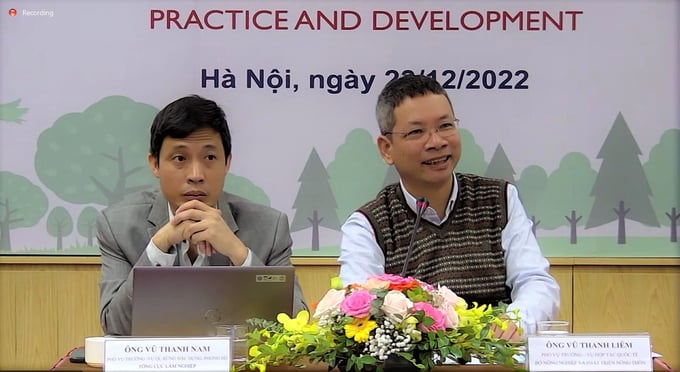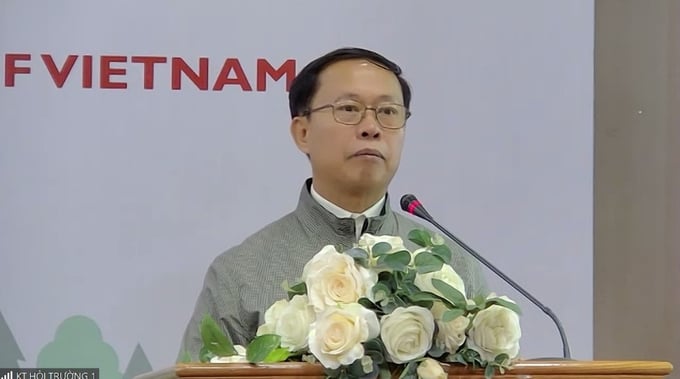May 21, 2025 | 08:44 GMT +7
May 21, 2025 | 08:44 GMT +7
Hotline: 0913.378.918
May 21, 2025 | 08:44 GMT +7
Hotline: 0913.378.918
The thematic workshop "Co-management in the forestry sector of Vietnam: practice and development" has just taken place in Hanoi, chaired by the Department of International Cooperation and the Administration of Forestry from the Ministry of Agriculture and Rural Development (MARD). The event welcomed the participation of agencies, departments and experts in related fields. The leading experts of the forestry sector had a discussion to identify effective forest management models, policy recommendations, and clarify the roles and responsibilities of actors in the process of forest management, protection and development.

The workshop was chaired by the Department of International Cooperation in collaboration with the General Department of Forestry on December 23 in Hanoi.
Speaking at the conference, Mr. Vu Thanh Nam, Deputy Director of the Department of Special-use Forests and Protection Forests (Administration of Forestry), said, “The community plays a very important role in forest management, protection and development. The Forestry Law 2017 stipulates that the State does not collect forest use fees, applicable to all three types of functional forests after allocating them to the community. But the current regulations on benefits and co-management are still somewhat vague and unclear.”
The Ministry of Agriculture and Rural Development has submitted to the Government a draft investment policy in forestry, which contains more details of regulations and guidelines on the steps of forest allocation, especially for communities. However, the work of amending and improving policies has encountered many difficulties and has not aroused community support for forest protection. The workshop was where experts would share practical experiences and effective models of forest development for the community.
Referring to the difficulties and challenges in implementing forest co-management, Dr. Nguyen Ba Ngai, Vice Chairman of the Vietnam Forest Owner Association, said that the community was not recognized by law as a legal entity at present. This led to difficulties when dealing with civil relations in forest management. Communities did not have many opportunities or conditions to access financial resources for forest management, protection and development.
The community's rights in forest management, protection and development are considered limited at a certain point. Communities are only allocated special-use forests which are sacred forests. Many forests have been managed by the community for a long time but have not been allocated from a legal standpoint. Regulations on cooperation and association of forest management boards and forest companies with the community are very few in number, leading to a situation where there is less emphasis on forest management cooperation with the community compared to other individuals and organizations.

Dr. Nguyen Ba Ngai, Vice Chairman of the Vietnam Forest Owner Association.
The results of research and summary assessment on forests allocated and contracted to communities show that forests allocated to communities are often impoverished forests in difficult-to-access locations. Even the areas where forest companies return to the locality and give back to the community and households are bad lands, located in remote locations, difficult to access.
Recognizing the difficulties and challenges between the community and stakeholders, Dr. Nguyen Ba Ngai proposed some policy recommendations so that the community could gain more drives to participate in forest management cooperation: 1) Amending and supplementing a number of regulations on forest land allocation and forest allocation to residential communities; 2) Amending and supplementing a number of regulations on the use of special-use forests; 3) Amending and supplementing a number of regulations on co-management of special-use forest; 4) Encourage the community to establish community cooperative groups for forest management; 5) Formulate and implement the National Program on effective management and use of 3 million ha of forest land and forests being managed by the People's Committees of communes (referred to as the Program of 3-million-ha forests).
“Concerning the proposal to supplement a number of regulations on the allocation of forest and forest lands to residential communities, I would like to inform the workshop that currently the project to amend the Land Law is being widely consulted and is being gradually synthesized and completed to submit to the National Assembly for verification. Residential communities have been concretized and included in three Articles, including Article 188 for production forest land, Article 189 for protection forest land, and Article 190 for special-use forest land.
“As for production forest land, the State clearly stipulates that the State allocates land and recognizes the right to use production forest land to residential communities in accordance with master plans and plans on land use approved by competent authorities. This is a good thing as it helps to increase the rights and recognition of the State for the residental community", said the representative of the Legal Department (MARD).
Translated by Samuel Pham

(VAN) Japan's grant aid project contributes to capacity building, promoting organic agricultural production, and fostering sustainable community development in Dong Thap province.

(VAN) For years, the CRISPR-Cas9 genome technology has been reshaping genetic engineering, a precision tool to transform everything from agriculture to medicine.

(VAN) Vietnam aims to become a 'leader' in the region in the capacity and managing effectively soil health and crop nutrition.
![Reducing emissions from rice fields: [Part 1] Farming clean rice together](https://t.ex-cdn.com/nongnghiepmoitruong.vn/608w/files/news/2025/05/05/z6509661417740_a647202949c539012a959e841c03e1d3-nongnghiep-143611.jpg)
(VAN) Growing clean rice helps reduce environmental pollution while increasing income, allowing farmers to feel secure in production and remain committed to their fields for the long term.
/2025/05/19/5136-1-144800_230.jpg)
(VAN) The Nghe An Provincial People's Committee has just approved the list of beneficiaries eligible for revenue from the Emission Reductions Payment Agreement (ERPA) in the North Central region for the year 2025.

(VAN) 14 out of 35 domesticated elephants in Dak Lak province have had their living conditions improved, with 11 of them currently participating in the non-riding elephant tourism model.

(VAN) Muong Nhe Nature Reserve hopes that being upgraded to a national park will lay the foundation for forest protection efforts to be carried out in a systematic, modern, and sustainable manner.